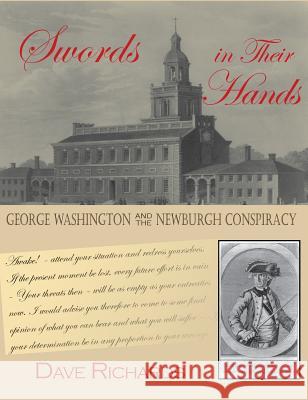Swords in Their Hands: George Washington and the Newburgh Conspiracy » książka
Swords in Their Hands: George Washington and the Newburgh Conspiracy
ISBN-13: 9781942016120 / Angielski / Twarda / 2015 / 400 str.
Swords in Their Hands: George Washington and the Newburgh Conspiracy
ISBN-13: 9781942016120 / Angielski / Twarda / 2015 / 400 str.
(netto: 161,66 VAT: 5%)
Najniższa cena z 30 dni: 159,88 zł
ok. 13-18 dni roboczych.
Darmowa dostawa!
Swords in Their Hands: George Washington and the Newburgh Conspiracy, is the first book-length account of the closest thing to a coup that the United States has ever experienced. In the autumn of 1782, many Revolutionary War officers in the Hudson Highlands have grown angry and frustrated that they have not been paid in months or even years. With victory over the British within sight, they begin to fear that they will never get their back pay and promised postwar pensions, because the Continental Congress in Philadelphia, meeting under the Articles of Confederation of 1777, has no power to raise funds to pay them. Two political factions are at loggerheads over taxation: nationalists want Congress to have direct taxation authority, while their opponents insist that only individual states should have the power to do so, as is the case under the Articles. As the new year begins and the last months of the war approach, several key army officers, supported by some nationalist members of Congress, set in motion a desperate plot: they will terrify state legislators, and their delegates in Congress, into granting Congress the direct taxation authority it needs, under threat of two alternatives. One option is to lay down their arms before victory is achieved, and let the British quell the colonists' rebellion; alternatively, after defeating the British, they will refuse to give up their arms unless their demands are met. In March 1783, hundreds of Washington's officers, "ready for revolt," gather at the Temple of Virtue in New Windsor, NY to agree on the first steps toward implementing their plan. But to their shock and chagrin, General Washington himself arrives, and in a 15-minute address changes the course of history.
Swords in Their Hands: George Washington and the Newburgh Conspiracy, is the first book-length account of the closest thing to a coup that the United States has ever experienced. In the autumn of 1782, many Revolutionary War officers in the Hudson Highlands have grown angry and frustrated that they have not been paid in months or even years. With victory over the British within sight, they begin to fear that they will never get their back pay and promised postwar pensions, because the Continental Congress in Philadelphia, meeting under the Articles of Confederation of 1777, has no power to raise funds to pay them. Two political factions are at loggerheads over taxation: nationalists want Congress to have direct taxation authority, while their opponents insist that only individual states should have the power to do so, as is the case under the Articles.As the new year begins and the last months of the war approach, several key army officers, supported by some nationalist members of Congress, set in motion a desperate plot: they will terrify state legislators, and their delegates in Congress, into granting Congress the direct taxation authority it needs, under threat of two alternatives. One option is to lay down their arms before victory is achieved, and let the British quell the colonists’ rebellion; alternatively, after defeating the British, they will refuse to give up their arms unless their demands are met.In March 1783, hundreds of Washington’s officers, “ready for revolt,” gather at the Temple of Virtue in New Windsor, NY to agree on the first steps toward implementing their plan. But to their shock and chagrin, General Washington himself arrives, and in a 15-minute address changes the course of history.











